- Home
- Gail Carson Levine
Dave at Night Page 5
Dave at Night Read online
Page 5
The street was now only a few yards away. A car’s headlamps flashed by. I hid behind a tree. Another car went by, and another. There was a lot of traffic here. Somebody might see me and call the police. Somebody might kidnap me.
Voices called out. I heard the tinkle of a piano.
I crept to a shoulder-high boulder and ducked behind it. Another car drove by. And another. This one stopped.
Had someone seen me?
A car door slammed. “Come back at three, Robert,” a man’s voice said.
I peeked around the boulder. A redheaded man leaned into the window of a chauffeured Pierce-Arrow. A lady waited for him, standing under the streetlight. I wished I could get a close-up look at the car, but it drove away. The man and the lady were all dressed up. The lady’s hat, which was shaped like an upside-down fishbowl, came down so low it covered her eyebrows. The man took her arm, and they went into the apartment building on the corner.
Four cars were parked at the curb. One of them was a Peerless. I couldn’t believe it—a Peerless. I had to go look at it.
No one was on the street. The piano started up again, coming from the building on the corner. I heard laughter. I stepped out and ran across the street.
Chapter 9
THE CAR GLEAMED, without a speck of dirt or mud. I peered through the driver’s window. The dashboard was mahogany. Papa wouldn’t believe it. It must have weighed a ton and cost a fortune. The speedometer went up to eighty miles an hour. I wondered what it would feel like to go that fast. There was an altimeter, so if you drove up a mountain you’d know how high you were. The gauges were edged in silver. It had an automatic starter—all the classy cars did.
There was more mahogany around the windows, and a mahogany rail to hang on to, and a—
I heard footsteps and men’s voices. I crouched behind the car. Somebody wailed. No, not somebody—some thing. It was the strangest sound I ever heard. It seemed to be laughing.
I peeked over the hood. A colored man playing a trumpet—a laughing trumpet—was walking backwards around the corner at the far end of the block. Another colored man was following him, clapping out a beat.
The door of the building on the corner opened, the same building the couple had gone into. A colored lady came out and hollered, “Hush, Martin, you’ll wake the neighbors.”
The trumpeter stopped playing and hollered back, “Your neighbors are fools to sleep when they could be stepping.”
The other man yelled, “I told him to be still. I shouted ‘Be still’ at least three times, but no matter how loud I hollered, he wouldn’t pay me any mind.”
The three of them laughed. The men went to the woman and each of them kissed her on the cheek. Then they went inside. I stood up. This sure was different from my old neighborhood.
I looked up at the building, which was seven stories tall, made of cream-colored brick. A stone pedestal sat on either side of the door, and on top of each pedestal, dark green ivy grew out of a big stone urn.
On the third floor the lights were on. I saw shapes against the half-open windows—a woman with her arms raised, a man smoking a long cigarette, two people talking.
A piece of paper wafted out of one of the windows. As it drifted down, I saw that it was a dollar. I grabbed it before it touched the ground. Then I ran back to the park and hid. Somebody was going to come after the dollar.
But nobody came out. Upstairs, a trumpet now blared along with the tinkling piano. My stomach growled. They were a bunch of rich people if they didn’t care about a dollar.
I tucked the money into the toe of my slipper and crossed the street again. I stood looking up at the building. Maybe they’d toss more money out. I wondered if there was any food in there. Meatballs. My mouth watered. Chicken. Lamb—
“So, nu? Are you going to return the money?” The voice came from behind me.
I ran.
“Get him,” the voice said.
There were two of them! Or more.
Wings beat at me. A bird! It kept crashing into my face. I put my arm up to knock it away. It squawked, “Gozlin! Holdupnik!”
Somebody grabbed my arm. “So you’re a thief and—”
“Make your bird—”
“Enough already, Bandit,” the human voice said. “I got him.”
The bird stopped batting at me.
“I don’t have any money.” I turned to see who held me.
An old white man with a long gray beard. I squirmed, but he was strong. I couldn’t get away. The bird, a big gray parrot, perched on his shoulder and squawked, “Tell for you your fortune?”
“Not yet, Bandit,” the old man said.
“I don’t have any money,” I repeated. My stomach rumbled loudly.
“You think I’m stupid? It’s in your slipper. Should I look?” He started to bend while still holding me.
“No. Don’t look.”
He straightened up. “All right, I won’t. We’ll just go inside and you’ll give it back.”
If I gave back this dollar, maybe I could stay awhile and pick up a few more. But how could I go inside dressed the way I was? “In pajamas?” I said.
He stood back and looked me over.
The parrot squawked again, “Tell for you your fortune?”
He let go of me and unknotted his tie, which had orange polka dots on a bright green background. He tied it around my neck. “Now you could go anywhere. And I look better too. The tie was pretentious.”
I didn’t know what he was talking about. His black suit sagged all over, and his beard could have belonged to Rip Van Winkle. His face sagged too, with bags under his eyes and drooping wrinkled skin on his cheeks. Tie or no tie, he was shabby.
“So, boychik, what’s your name? I should know my own grandson’s name.”
Why would he pretend I was his grandson? I didn’t answer. My stomach growled again.
“You’re hungry, boychik? There’s plenty of food upstairs.”
The parrot squawked, “Boychik.”
“Dave Rubino,” I said, borrowing our old boarders’ last name. I wanted this adventure to keep going. It was like a dream—a parrot in my face, a Peerless, pajamas and a tie.
“Pleased to make your acquaintance. I’m Solomon Gruber. Solly the gonif.” He held out his hand for me to shake.
We shook. I wondered what a gonif was. I knew it was a Yiddish word. You couldn’t live in my neighborhood and not recognize Yiddish. I knew a few words. I knew what a boychik was—a little boy. But we were Sephardic Jews. We didn’t come from the places where people spoke Yiddish, like Russia and Germany. Papa spoke Spanish and Turkish and English and Ladino, which is a mixture of Spanish and Hebrew. I only spoke English.
We went up three stone steps to get into the building. “Hey, Solly,” the elevator man called as we came through the door.
“Shalom, your honor,” Solly said. “Who’s on the piano?”
“Jake.”
“Good.”
We stepped into the elevator. There was a flowered carpet, and the walls were red. The elevator man closed the brass gate. We rose, and I watched the second floor go by.
The parrot squawked, “In the cards. In the cards.”
The elevator man got out with us on the third floor. The music was louder here. The hall was filled with furniture—a dresser, a bed, a table, a couch, even a huge cactus. We had to pick our way around everything to get to the door of the apartment the noise was coming from.
“Who’s the boy, Solly?” A colored lady sat at a table outside the apartment. On the table was a glass bowl half filled with change. Twenty dollars or more. A fortune.
“My grandson. Dave Rubino, meet Mary Lou Barnes. Dave has the power, just like me. Not like his parents, the alrightniks.”
Alrightniks? Power?
She smiled. “Pleased to meet you. Pretty tie.”
“Thank you, Miss Barnes.” I blushed, feeling silly in pajamas and a tie.
“Ante up, Solly.”
“Ante up,”
the parrot squawked.
He took a quarter out of his pocket and dropped it in the bowl.
“Your grandson, Solly.”
“He’s only six.”
“If he’s six, then I’m a mackerel. Pay up. It’s a good crowd. You’ll make plenty tonight.”
That meant he worked here. I didn’t understand.
“Okay, okay. I’m paying.” He put more money in the bowl. “And here’s a nickel for the boychik’s dinner. He’s hungry.”
Wait. What about me giving back the dollar?
“Come,” Solly said. “Show them you have the power.”
Chapter 10
I FOLLOWED SOLLY through the open door into a big room filled with grown-ups but no furniture, just some chairs pushed against the wall. Most of the people were colored, but a few were white. The redheaded man who’d come in the Pierce-Arrow was standing near me.
I stood still, staring.
The air was full of perfume. If I stuck out my tongue, I’d taste it. Everyone was dressed up. Some of the men’s suits were surprising colors, like light blue or dark yellow. And some of their trousers were crazily wide. You could make two pairs of pants out of that much cloth. The women’s dresses were the opposite—not enough cloth. They only covered the ladies’ legs down to their knees.
The lady closest to me had a fox fur wrapped around her shoulders, even though it was hot in here. I knew it was fox because the head was right there, under her chin, and the little feet hung down on her chest.
Everybody seemed happy. They reminded me of Papa and his brothers and sisters when they used to get together.
“Nice, isn’t it, boychik?” Solly had to shout for me to hear him. Everybody else was yelling, and underneath the voices was the hum of music coming from somewhere deeper in the apartment.
I nodded.
“I wish my grandfather took me to a rent party when I was your age. Not that there were any.”
“What’s a rent party?”
“In Harlem if you can’t pay the rent you have a party. The quarter everybody paid to get in, that will be the rent.”
If only Ida had known!
“What did you mean before when you said I had ‘the power’?”
He ignored the question. “First a little pleasure, then a little business. You’ll eat and I’ll listen to the music. Then we’ll work.”
I didn’t ask about the dollar. I didn’t want to remind him of it.
He grabbed my arm. “Boychik, are you a landsman?”
“What’s a lontsmon, Mr. Gruber?”
“Call me Grandpa. If you don’t know, you aren’t.” He paused. “Dave Rubino. . . . Could be Sephardic. A landsman is a fellow Jew.”
“I’m Sephardic.”
“Then don’t eat the meat. It might be pork. If you’re kosher, don’t eat anything.” He patted my cheek. “Have fun, boychik.” He pushed his way through the crowd to a doorway at the end of the room.
All around me people were eating and talking. The food was on a table against the wall. I pushed through the crowd. At home, we weren’t kosher. But even if I was, I might have eaten anyway. This was food that smelled like food. I loaded my plate with chicken, potato salad, cole slaw, rice and beans, and bread.
I ate standing up, facing the wall across the table. The wallpaper was pale green leaves with big pale violet flowers. I stared at it, my mind on what was in my mouth. The chicken was the best—peppery and juicy. When I finished eating two loaded plates, I poured myself a glass of water from a white china pitcher.
“Don’t drink that, pajama boy, if you want to live.”
I turned around. A colored girl about my age smiled at me like I was the newest thing in the world. New, and she was glad I’d come along.
“Uhhh,” I said.
She laughed. “Don’t drink it. They pretend it’s gin, but they put in kerosene and a lot of other junk.”
Kerosene! I put the glass down. “I thought it was water.” Without thinking, I added, “You look like a flower.” It was the way she stood—straight with her head tilted up, a skinny stem holding up a beautiful face.
“A flower would wear a green dress. This is blue.” She laughed again.
I shrugged, embarrassed at what I’d said.
“Do you want some water?”
“Uh-huh.”
“Come with me.” She took my hand. “Bring your glass.” I picked the glass up with my other hand, and she pulled me through the crowd.
Her hand was smaller than mine. I didn’t want to crush it, but I didn’t want to hold it so loosely that we got separated. Was I holding it too hard or too soft? I tried to keep the pressure steady, and my hand ached from the effort.
As we moved through the room, people kept calling out to her.
“That young Irma Lee sure looks pretty.”
“I swear that child is going to break some hearts.”
“Hey, Irma Lee! Where’s your mama, girl?”
She answered the last one. “Somewhere, gabbing.”
We entered a long, narrow hall that was also crowded. This was the biggest apartment I’d ever seen. We passed a closed door. Irma Lee cocked her head at it. “Poker. Craps.”
As we went farther along, the music got louder. The drum played by itself for a minute. I found myself walking to the beat. We turned into a short hall with doors on the right and the left. Irma Lee pulled me into the left-hand door and then let go of my hand.
We were in the kitchen. Two women sat at the table. I smiled at them, wishing again that I wasn’t in pajamas. Irma Lee ignored them. I heard her mutter, “Darn!” She rinsed my glass, and I noticed there were two faucets. This apartment got hot water, not just cold. I looked around. There was a gas stove, not coal, and the icebox was three times the size of ours at home. No wonder they had to throw a party to pay the rent. It was probably ten times what Papa used to pay.
Outside the kitchen, the drum got softer and the other instruments joined in.
“Baby girl!” one of the ladies said. “Come to your mama.”
Irma Lee looked at me for a second, and there was a message in the look, but I didn’t know what it was. She filled my glass and gave it to me. Then she took my hand again and tugged me along to the table. “Yes, ma’am. Here I am.”
Irma Lee’s mama gathered her into a hug—except Irma Lee’s arm stuck out, because her hand still held mine. “Having a fine time, baby girl?” her mama murmured into Irma Lee’s hair.
I watched them while I drank the water. They didn’t look alike. Irma Lee was delicate. Her mother was tall, with a broad face and large features. She was colored too, but she was lighter than Irma Lee.
“I’m not a baby, Mama.” Irma Lee’s voice was muffled against her mother’s chest. “Let me go.”
“I know you’re not, baby girl.” Her mama released Irma Lee, who gave herself a little shake. “Say hello to your cousin, baby—Irma Lee, and introduce us to your young friend . . .” Her eyebrows went up. “. . . in the outlandish duds.”
“Mama! They’re not outlandish. They’re . . . uh . . . swell.”
She was swell!
Irma Lee went on. “Hello, Cousin Emmie, ma’am. Thank you for inviting me to your party.”
“Hello, honey,” the cousin said. She was a plump woman with short hair, held away from her face by two silver barrettes.
Irma Lee couldn’t introduce me because she didn’t know my name. “I’m Dave Caros.” Oops! I should have said Rubino, the name I’d given Solly. Or I should have said Gruber. “I’m Solly Gruber’s grandson.”
“Solly!” Irma Lee’s mama said. “Is that old gonif here? Tell him to come say hi to Odelia.”
“Yes, missus,” I said.
“I’m Mrs. Packer, Irma Lee’s mama.”
“Can I be excused, Mama?” Irma Lee said. “I was showing Dave around.”
“Go on, baby. I won’t keep you,” Mrs. Packer said. Then she called after us, “Don’t tell him every idea that pops into your head, honey.
Keep something to yourself.”
“Mama!” Irma Lee pulled me out of the room. Outside, she spun around. She whispered in a rush, “She acts like I’m six. I hate when she does that. I wish she wouldn’t say a single word. Not a single word.” She calmed down. “Do you need to find your granddaddy?”
I shook my head. “The old gonif will find me.”
“Come on then.” She led me back through the apartment and out the door to the stairs next to the elevator. We sat on the steps going up to the next floor.
“She’s not my real mama,” Irma Lee said. “She’s my real mama’s cousin. She adopted me when my real mama and my daddy died.”
Irma Lee was an orphan too.
“I—” I stopped. I had almost told her I was an orphan. But I couldn’t, because Solly’s alrightniks—whatever they were—were supposed to be my parents. “Um, I’m sorry about your mother and father.”
She shook her head and her two braids danced. “I don’t remember them. I was only two. Odelia’s my mama, except when she hugs me in front of people and talks too much, and some other times.” She giggled. “Now how come your mama let you out of her house in your pajamas?”
I couldn’t tell the truth, but I didn’t want to lie either. “She doesn’t know.” The words were true, but I was fooling her, so it was really a lie. “Sol—Grandpa and I snuck out together. He gave me his tie to wear.”
“It’s . . .” She laughed. “. . . swell, like I told Mama.” Then she took both my hands. “Dave Caros, don’t lie to me.” I stopped breathing. Did she know about the dollar? “Will you be my friend?”
Chapter 11
I SAID YES, even though I’d probably never see her again. I wanted to be her friend. “Good.” She leaned back and crossed her ankles. She didn’t say anything, just smiled at me.

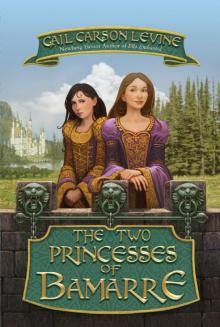 The Two Princesses of Bamarre
The Two Princesses of Bamarre Dave at Night
Dave at Night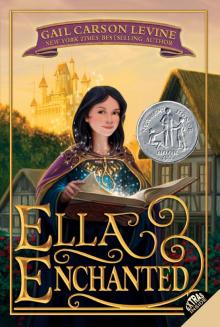 Ella Enchanted
Ella Enchanted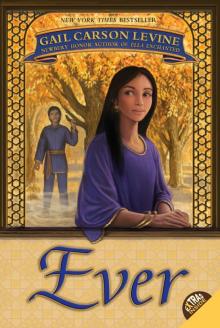 Ever
Ever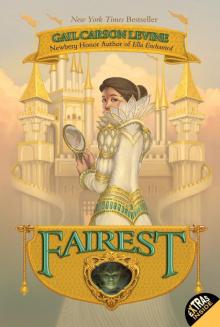 Fairest
Fairest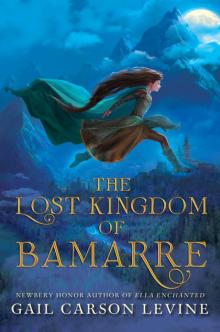 The Lost Kingdom of Bamarre
The Lost Kingdom of Bamarre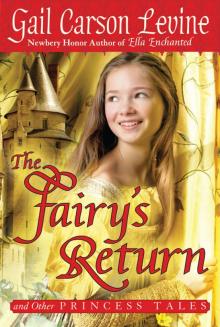 The Fairy's Return and Other Princess Tales
The Fairy's Return and Other Princess Tales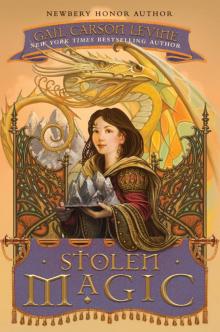 Stolen Magic
Stolen Magic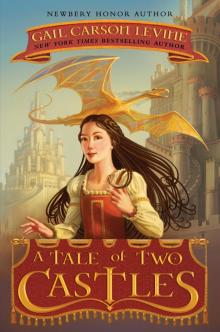 A Tale of Two Castles
A Tale of Two Castles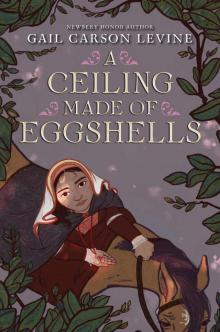 A Ceiling Made of Eggshells
A Ceiling Made of Eggshells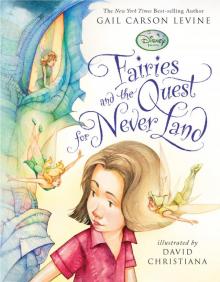 Fairies and the Quest for Never Land
Fairies and the Quest for Never Land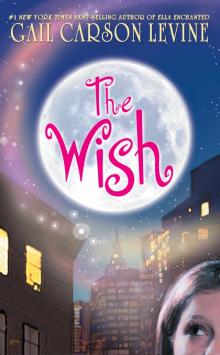 The Wish
The Wish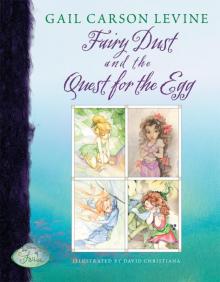 Fairy Dust and the Quest for the Egg
Fairy Dust and the Quest for the Egg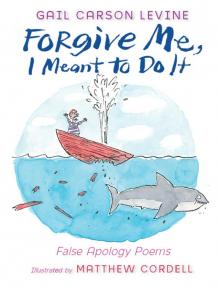 Forgive Me, I Meant to Do It: False Apology Poems
Forgive Me, I Meant to Do It: False Apology Poems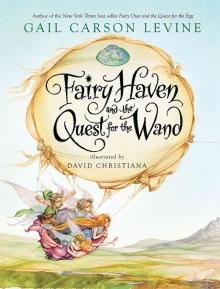 Fairy Haven and the Quest for the Wand
Fairy Haven and the Quest for the Wand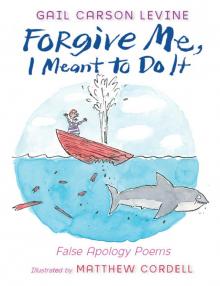 Forgive Me, I Meant to Do It
Forgive Me, I Meant to Do It